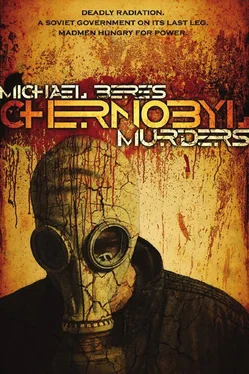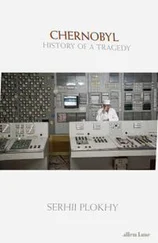Michael Beres - Chernobyl Murders
Здесь есть возможность читать онлайн «Michael Beres - Chernobyl Murders» весь текст электронной книги совершенно бесплатно (целиком полную версию без сокращений). В некоторых случаях можно слушать аудио, скачать через торрент в формате fb2 и присутствует краткое содержание. Жанр: Триллер, на английском языке. Описание произведения, (предисловие) а так же отзывы посетителей доступны на портале библиотеки ЛибКат.
- Название:Chernobyl Murders
- Автор:
- Жанр:
- Год:неизвестен
- ISBN:нет данных
- Рейтинг книги:4 / 5. Голосов: 1
-
Избранное:Добавить в избранное
- Отзывы:
-
Ваша оценка:
- 80
- 1
- 2
- 3
- 4
- 5
Chernobyl Murders: краткое содержание, описание и аннотация
Предлагаем к чтению аннотацию, описание, краткое содержание или предисловие (зависит от того, что написал сам автор книги «Chernobyl Murders»). Если вы не нашли необходимую информацию о книге — напишите в комментариях, мы постараемся отыскать её.
Chernobyl Murders — читать онлайн бесплатно полную книгу (весь текст) целиком
Ниже представлен текст книги, разбитый по страницам. Система сохранения места последней прочитанной страницы, позволяет с удобством читать онлайн бесплатно книгу «Chernobyl Murders», без необходимости каждый раз заново искать на чём Вы остановились. Поставьте закладку, и сможете в любой момент перейти на страницу, на которой закончили чтение.
Интервал:
Закладка:
“What benefits?”
“You send in observers from other plants and from industry so they’ll learn, without speculation, what actually happens in the event of a nuclear accident. The loss of millions in war did a lot to make the union strong. With this kind of thinking carried to its extreme, who knows what advantages can be dreamed up? We’d learn about radioactive fallout and its effects on humans. We’d be able to see the effects on people and local government and medical facilities. We’d be able to extrapolate these data to create models of nuclear accidents and nuclear war.”
“Mihaly, this is insane!”
“You told me to get it out of my system, Laz. I’m simply telling you about my speculation. The safety at the plant is failing, and everyone aware of it is trying to come up with a reason. Can you think of a sane reason to reduce safety standards?” Mihaly took a gulp of wine. “Maybe I’m too close to the situation. Maybe it’s the pressure making me come up with crazy theories.”
“I’m not trying to talk you out of it, Mihaly. If you really think there’s a problem, if safety has taken a back seat, quit your job, get transferred.”
“I’m going to apply for a transfer,” said Mihaly. “That’s why I’ve told you… to convince myself to go through with it. They’ve got too many working at the plant as it is. Too many cooks in the she-demon’s kitchen. When I complained about an upcoming test, my chief said to tell my men if things aren’t done right, they’ll have to turn in their Party cards. When I reminded him the men under me don’t have Party cards, he jokes they should get them so if something goes wrong, they’ll have cards to turn in. He’s more concerned about minor things, like workers smoking hashish in the locker room. When I complained about the printout for reactor conditions being too far from the control room to do us any good in an emergency, he said to use one of my men as a runner to bring the printout to the control room. He’s gotten things upside down.”
“Mihaly, if you’re thinking of revealing this to anyone else, forget it. Do whatever seems reasonable to point out obvious safety flaws.
But don’t draw attention to yourself. Don’t get labeled a counterrevolutionary by questioning the system. Whatever you do, don’t mention conspiracy. Without mountains of documentation, no one will believe you. You’ll be fired, and then there will be documentation, all of it against you, against your character. The KGB will be up your ass. You’ll be fucked! Don’t even think of telling anyone else. If you can’t get a transfer, quit. I’ll see about getting you a job in Kiev. You and Nina and the girls can move in with me. You can have my apartment. Tell me you’ll get out of there, Mihaly!”
“I’ll get out,” said Mihaly, gulping down more wine. “I would have told you about this yesterday if Cousin Andrew hadn’t been here. Hiding Bela’s shortwave radio before Andrew and his wife arrived brought back the old fears from my university days. I’m glad we’re alone and it’s off my chest. As brothers, we should be honest with one another.”
After drinking to secrecy, Lazlo and Mihaly hugged in the darkness of the wine cellar as if they were the last two souls on earth.
While they hugged, Lazlo promised himself he would someday be honest with Mihaly and tell about the killing of the deserter. Someday soon.
3
Morning dew weighed heavily on late-summer foliage along the Pripyat to Chernobyl Road. At the gate of the nuclear facility operated by the Ministry of Energy, a guard inspected a car waiting to get in.
The few employees who commuted by car had to stop at the main gate for identification and sometimes a look into the luggage compartment. Buses passed more quickly because a guard assigned to each bus checked identification and inspected briefcases and lunch containers while the bus was in transit.
When entering the main gate, the first buildings one saw were laboratory buildings, including the low-level counting laboratory operated by the Department of Industrial Safety. Incoming buses stopped here first. The building, set back from the road, was inside another fence and inspection gate. This inner fence was not capped with barbed wire like the main fence. Its purpose was to keep out stray animals or ignorant maintenance workers who might bring unwanted radiation into the building. If there were a “spill” of nuclear material at Chernobyl, however small, and if some of it were to contaminate the low-level laboratory, it would put them out of business. Recently, the head of safety at the plant had ordered low-level laboratory personnel to take their pocket dosimeters home with them in the unlikely event they picked up radiation on the bus or elsewhere. Along with the written order was a strongly worded message saying the measure was experimental and anyone generating unfounded rumors would be dealt with severely.
The low-level laboratory housed a monitoring system to analyze samples from numerous locations surrounding Chernobyl, as well as samples from all over the Ukraine. The equipment here could detect radiation levels so small, background radiation caused by cosmic rays from outer space had to be shielded out using steel vaults. Within the vaults, samples were analyzed by counting ionizing particles of radiation through the use of ionization chambers commonly called Geiger counters.
The building had two upper floors, a basement, and a sub-basement. The upper floors contained offices for engineers and scientists, laboratories for converting samples into gases to be put into Geiger tubes, and computer equipment to analyze data. The electronic counting equipment and the vaults, referred to as “tombs” by technicians, were below ground in the windowless basement and sub-basement. The technicians called themselves “moles.”
Juli Popovics was a mole. Like many technicians who worked in the sub-basement, she was well acquainted with radioactivity and its terminology. Strontium, half-lives, and the characteristics of radionuclides such as krypton-85 and cesium-137 were second nature to her. Although the advertised reason for the low-level counting lab was safety, she knew it had another purpose. Scrubbers were installed on site to camouflage the extent to which reactor fuel was reprocessed before dangerous fission products had a chance to decay.
Few technicians at Chernobyl were aware the Americans and British had developed a way to measure radionuclide off-gassing and use the measurements to estimate weapons-grade fuel reprocessing.
The only reason Juli knew of these techniques was because of another technician named Aleksandra Yasinsky.
Juli and Aleksandra graduated university together and came to work at Chernobyl and live in Pripyat the same year. Aleksandra was a dear friend, but she was also an activist. Aleksandra kept charts in her desk showing ongoing increases of radioactive noble gases based on air samples taken outside the plant. Aleksandra said scientists throughout the world would someday have to answer for increases caused by nuclear production. Aleksandra thought she was helping by keeping the charts. The plant manager, notified by plant security, felt differently. One day Aleksandra was at work; the next day she was gone. According to the fabricated story, Aleksandra had transferred to the Balakovsky power plant. But Juli knew Aleksandra no longer worked for the Ministry of Energy because on a visit to Moscow, she had met with Aleksandra’s mother, who broke down in tears when asked about her daughter.
Each morning, before going downstairs where she once worked side by side with her friend Aleksandra, Juli paused at the windows inside the building entrance near the dosimeter rack. After dropping off her dosimeter and picking up a recharged one, she looked back outside to memorize weather conditions before descending into her hole. At lunchtime, when she came out of her hole, she immediately looked out the window again to see how the weather might have changed. After lunch she repeated the process, looking forward to the end of the shift. In winter, however, after being in the fluorescent-lit basement all day, the darkness outside became an even deeper hole, a hole into which she, like Aleksandra, would someday disappear.
Читать дальшеИнтервал:
Закладка:
Похожие книги на «Chernobyl Murders»
Представляем Вашему вниманию похожие книги на «Chernobyl Murders» списком для выбора. Мы отобрали схожую по названию и смыслу литературу в надежде предоставить читателям больше вариантов отыскать новые, интересные, ещё непрочитанные произведения.
Обсуждение, отзывы о книге «Chernobyl Murders» и просто собственные мнения читателей. Оставьте ваши комментарии, напишите, что Вы думаете о произведении, его смысле или главных героях. Укажите что конкретно понравилось, а что нет, и почему Вы так считаете.












